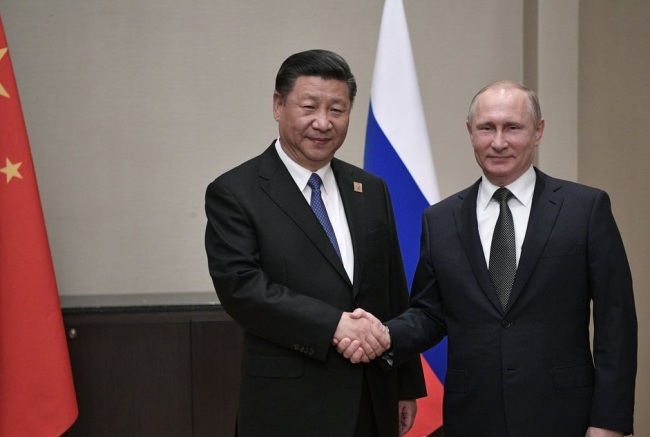Despite a series of complaints from North Korea against sanctions imposed against the country, its key business partners are showing signs of upholding the measures drawn to cripple the rogue nation’s economic growth.
 |
(From left) Chinese President Xi Jinping and Russian President Vladimir Putin. (Yonhap) |
North Korea’s exports to China in October dropped 62 percent on-year, amounting to about $90 million, showed Chinese customs data released Thursday. The figure also fell nearly 38 percent compared to $145.8 in September.
The data also indicated that China has blocked all imports of key trade items from the North, such as coal, iron, lead, aluminum, zinc or copper, Bloomberg said Friday.
The abrupt decline in the figures represents a whole month of China’s trade with North Korea, following the announcement of the United Nations Security Council resolutions, which came into effect on Sept. 5. The set of rules impose a total ban of coal trade with the North.
China has also decided to “temporarily” shut down the Sino-Korean Friendship Bridge, which has acted as a main gateway of trade between the two communist nations. The bridge, which links North Korea with the Chinese city of Dandong, will be closed for maintenance work on the North side, Chinese Foreign Ministry spokesman Geng Shuang said at a regular press briefing in Beijing on Friday.
However, a specific timeframe for the reopening of the bridge was not mentioned.
The signs of tighter restrictions come amid declining ties between the neighboring communist countries. North Korea’s relentless nuclear and missile provocations have irked Beijing, media reports claimed.
But hostility seems to be escalating on both sides with the North expressing distaste over Chinese President Xi Jinping’s support for North Korean sanctions, following a bilateral summit with US President Donald Trump earlier this month.
In response to China’s latest move to dispatch a special envoy to Pyongyang, North Korean leader Kim Jong-un refused to talk to the envoy in person. Song Tao, the head of the International Liaison Department of the Communist Party of China, reportedly met with a few high-ranking North Korean officials, but failed to meet Kim as Song refused to comply with Pyongyang’s request to ease off its sanctions against the country, Japan’s Nihon Keizai Shimbun reported Saturday, citing diplomatic sources.
Meanwhile, Russia has decided not to assign a quota for North Korean workers next year, hinting that no new labor contracts will be further signed, Russia’s state-owned agency RIA Novosti said Friday.
Around 30,000 to 40,000 North Korean migrants are believed to be legally working in Russia today.
Moscow’s decision is largely viewed as efforts to uphold UN Security Council Resolution 2375, unanimously approved on Sept. 11, which aims to curb the hiring of North Korean laborers in foreign nations.
The UN estimated the latest ban would slash North Korea’s $3 billion annual export revenue by a third.
Earlier this month, North Korea called for an immediate halt of the sanctions against it, calling the measures “constituted genocide,” the North Korean mission to the UN in Geneva said in a statement.
By Jung Min-kyung (
mkjung@heraldcorp.com)








